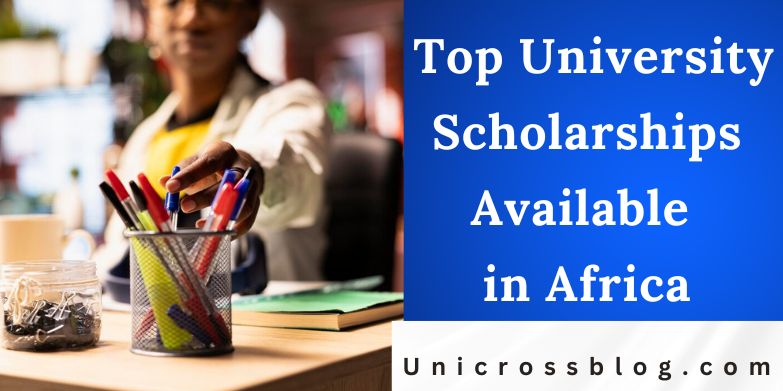Africa’s higher education landscape is vibrant and diverse, with top universities across the continent offering world-class programs in fields like engineering, health sciences, business, and social sciences. However, financial barriers often limit access for talented students, particularly those from underrepresented backgrounds. Fortunately, numerous scholarships are available to support African students, covering tuition, living expenses, and more. These opportunities, often fully funded, come from universities, governments, and international organizations like the Mastercard Foundation and the African Development Bank. In 2025, as the continent advances its Continental Education Strategy for Africa (CESA 2016-2025), scholarships emphasize leadership, innovation, and sustainable development.
This guide highlights some of the top university scholarships available in Africa for the 2025-2026 academic year. Focused on prestigious institutions in countries like South Africa, Ghana, Kenya, and Rwanda, these programs target undergraduate, master’s, and PhD levels. Eligibility typically includes academic excellence, financial need, and commitment to Africa’s growth. Applications often require essays, recommendations, and proof of admission.

Top University Scholarships in Africa
Here are seven standout scholarships from leading African universities, selected for their funding generosity, prestige, and impact on African students. They prioritize sub-Saharan applicants and cover a range of disciplines.
1. Mastercard Foundation Scholars Program at University of Cape Town (UCT), South Africa
UCT, Africa’s top-ranked university (QS World University Rankings 2025), partners with the Mastercard Foundation to offer fully funded undergraduate and postgraduate scholarships. Valued at up to $50,000 per year, it covers tuition, accommodation, books, stipends, and travel. Open to African students from low-income backgrounds pursuing degrees in commerce, engineering, health sciences, or humanities. Scholars join a leadership cohort with mentorship and internships. Applications open March 2025 for 2026 entry; requires a 70%+ high school average and an essay on community impact.
2. Mastercard Foundation Scholars Program at Stellenbosch University, South Africa
Ranked in the global top 300, Stellenbosch provides fully funded awards for 200+ scholars annually. Benefits include full tuition remission, housing, meals, health insurance, and a R120,000 annual stipend. Targets master’s and PhD students in agriculture, sciences, and social justice fields from sub-Saharan Africa. Non-South Africans must commit to 10 years of post-study service in their home countries. Deadline: June 30, 2025; emphasizes leadership potential via interviews.
3. Mastercard Foundation Innovation and Technology Scholarships at United States International University-Africa (USIU-Africa), Kenya
USIU-Africa, East Africa’s premier private university, offers fully funded bachelor’s scholarships in data science, IT, and engineering. Covers 100% tuition, laptops, internships, and living allowances for Kenyan and regional African students. Aimed at financially disadvantaged youth with strong STEM aptitude; includes entrepreneurship training. Applications due September 14, 2025; selection based on essays and aptitude tests.
4. Ashesi University Merit and Need-Based Scholarships, Ghana
Ashesi, a top liberal arts university in West Africa, awards need-blind scholarships covering up to 100% of costs for undergraduates in computer science, business, and engineering. Funded by partners like the MasterCard Foundation, it includes tuition, room and board, and a $1,000 laptop stipend. Open to Ghanaians and other Africans demonstrating financial need and a minimum 3.0 GPA equivalent. Holistic review includes interviews; deadline: March 1, 2026.
5. African Leadership University (ALU) NextGen Scholarships, Rwanda and Mauritius
ALU’s innovative campuses offer fully funded spots for bachelor’s in entrepreneurship and software engineering. Scholarships cover tuition, housing, meals, and stipends up to $10,000 annually, targeting young Africans aged 18-24 with leadership potential. Focuses on venture-building skills; includes global exchanges. Applications ongoing for September 2025 intake, with rolling deadlines and cohort-based selection emphasizing resilience stories.
6. University of Pretoria Commonwealth Doctoral Scholarships, South Africa
UP, a research powerhouse, provides fully funded PhDs in sciences, law, and economics for Commonwealth African citizens. Awards include R200,000+ annually for tuition, research costs, and living expenses. Requires a master’s degree and proposal aligned with UP’s themes like sustainable agriculture. Deadline: September 20, 2025; prioritizes collaborative research impact.
7. WAAW Foundation Scholarships at Various African Universities
The Working to Advance African Women (WAAW) supports 40+ STEM undergraduates at universities like University of Ghana and Makerere University (Uganda). Offers $500-$1,500 partial funding for tuition and books, plus mentorship for women from Nigeria, Ghana, Uganda, and beyond. Targets first-year students with 3.0+ GPA; annual deadline: November 2025.
READ ALSO: Short Course Scholarships for Professionals in 2025
FAQs
Who is eligible for these scholarships?
Most target sub-Saharan African citizens with strong academics (e.g., 70%+), financial need, and leadership potential. Some, like ALU’s, are open to all Africans; others specify countries like Kenya or Ghana.
Are scholarships only for South African universities?
No. while South Africa hosts many (due to its advanced infrastructure), options span Ghana, Kenya, Rwanda, and Uganda, promoting pan-African mobility.
What documents are typically required?
Admission letter, transcripts, financial need proof, personal statement, and two references. Some require interviews or proposals for PhD levels.
Can international (non-African) students apply?
Rarely—these prioritize Africans, but programs like UP’s Commonwealth may include select global applicants.
Do scholarships cover post-graduation support?
Yes, many like Stellenbosch require 10-year service commitments, while others offer alumni networks and job placements.
How competitive are they?
Highly acceptance rates under 10% for Mastercard programs—but holistic criteria value resilience over perfect scores.
Can I apply to multiple scholarships at once?
Yes, but check each program’s rules, as some, like Mastercard, may restrict simultaneous applications to other major funding sources.
Are there scholarships for non-STEM fields?
Yes, programs like UCT’s Mastercard and Ashesi cover humanities, social sciences, and business, though STEM fields dominate.
What if I miss a deadline?
Most programs have strict deadlines, but ALU’s rolling admissions offer flexibility. Contact universities for late application options or waitlists.
Do I need to repay these scholarships?
No, these are grants, not loans, though some, like Stellenbosch, require post-graduation service commitments in Africa.
Can I study part-time with these scholarships?
Most require full-time enrollment, but WAAW and some Ashesi awards may allow flexibility for part-time STEM students.
Are there age restrictions?
ALU targets 18-24-year-olds; others, like UCT and UP, have no strict age limits but prioritize recent graduates.
How are applications evaluated?
Based on academic merit, financial need, leadership potential, and alignment with program goals, often via essays and interviews.







